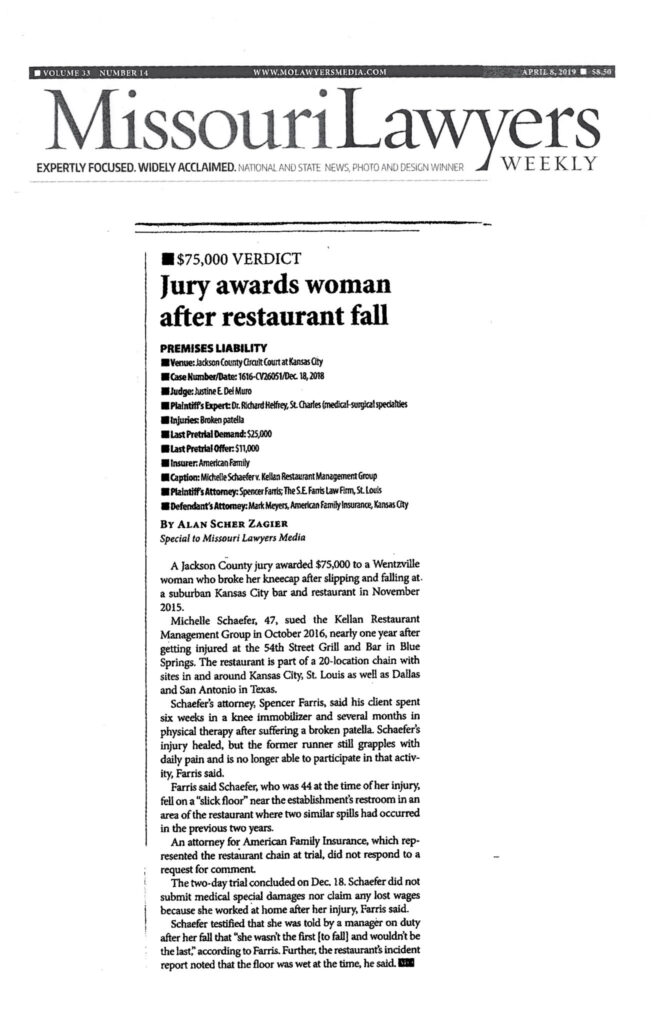
Let’s be honest—when you head out to enjoy a casual meal, you expect a decent burger, a cold drink, and a trip to the restroom without sustaining orthopedic trauma. Unfortunately, for our client Michelle Schaefer, her visit to the 54th Street Grill and Bar in Blue Springs, Missouri, came with a side of “life-altering injury,” courtesy of a floor slicker than a politician during election season.
In December 2018, a Jackson County jury awarded Ms. Schaefer $75,000 after she broke her kneecap in a fall—yes, the patella, that charming little bone in the front of the knee that makes walking possible and running something other than torture. It took less than two days of testimony to convince a jury that maybe, just maybe, a business should clean its floors—or at least warn people that they’re skating rinks in disguise.
The Injury: Not Your Everyday Oops
Ms. Schaefer, then 44, was simply walking near the restroom. No parkour. No race to the salad bar. Just a routine trip to the facilities. The next thing she knew, she was down and injured. We’re not talking about a stubbed toe or a bruised ego—we’re talking about a broken patella. That’s the kind of injury that turns stairs into Everest and ends running careers.
For a woman who once took pride in her active lifestyle, this was not a mere inconvenience. It was a life-changing moment. She spent six weeks in a knee immobilizer, followed by months of grueling physical therapy. There were days she couldn’t drive, couldn’t sleep, couldn’t even stand for long without pain. She recovered as much as anyone can from a shattered kneecap—but now lives with daily pain and the joy of explaining to friends why she no longer joins 5Ks or volunteers to chase down stray dogs.
Even mundane tasks became feats of endurance. Going to the grocery store? A calculated risk. Bending down to grab a laundry basket? Potential hazard. And let’s not even talk about airport security lines. The ripple effects of a single preventable fall turned her daily life into an obstacle course of discomfort, limitation, and frustration.
The Establishment’s Track Record: A Real Nail-Biter
Now, you might be thinking, “Okay, accidents happen.” True. But here’s where it gets rich: this wasn’t the first slip-and-fall in that area of the restaurant. In fact, two similar incidents had occurred in the previous two years. That’s not a fluke—that’s a pattern. Maybe there was a sale on banana peels? Maybe “wet floor” was just their design aesthetic?
When Ms. Schaefer lay injured, the manager on duty offered her the kind of comforting corporate empathy we’ve all come to expect: “You weren’t the first and you won’t be the last.” Great. Just the kind of thing you want to hear while cradling your shattered kneecap—your injury is part of a proud tradition. Maybe they’ll name a booth after her.
To put it plainly, the floor was wet. The restaurant knew it had a problem. And like so many negligent businesses, they opted for the tried-and-true strategy of doing nothing. No warning signs. No traction mats. No corrective measures. After all, it’s not like customers are expecting a safe place to walk, right?
The Trial: Insurance Company Roulette
Despite clear evidence of fault, American Family Insurance—the legal arm of this hospitality horror story—decided to test its luck. Their last pretrial offer? A generous $11,000. We countered with a reasonable $25,000.
Cue the courtroom drama. You can probably guess how it went. The jury came back with $75,000. That’s three times our demand, and nearly seven times what the defense thought Ms. Schaefer’s pain, suffering, and permanent injury were worth. Apparently, someone forgot that juries don’t appreciate corporate indifference—or being treated like they just fell off a slick floor themselves.
What’s more, Ms. Schaefer didn’t even submit a claim for lost wages. She worked from home, kept her head down, and did her best to recover. She wasn’t after a windfall. She wanted fairness. She wanted accountability. And that’s what she got.
The jury didn’t just hear her story—they understood it. They saw through the insurance company’s lowball tactics and recognized that sometimes, justice looks like telling a business: “This is not okay.”
The Takeaway: A Wet Floor Sign Isn’t Just a Suggestion
Premises liability exists for a reason. Businesses owe a duty to the people they invite in—especially when those people are paying customers. That includes cleaning up spills, warning of dangers, and generally not turning their dining rooms into low-budget obstacle courses.
This isn’t about holding businesses to impossible standards. It’s about holding them to basic ones. Clean up your mess. Warn people when there’s a hazard. Don’t let the same spot be a trap year after year. It’s not rocket science—it’s human decency.
Juries understand that. Unfortunately, it often takes a lawsuit and a courtroom to remind some companies that the safety of real people matters more than saving a few dollars on insurance premiums.
At The S.E. Farris Law Firm, we fight for clients like Michelle—people who didn’t ask to be injured and certainly didn’t deserve to be dismissed. If you’ve been hurt because a business cut corners or ignored obvious hazards, we’re here to help. We’ll bring the facts. We’ll tell your story. And maybe, just maybe, we’ll bring a little sarcasm too—for dramatic effect, of course.
